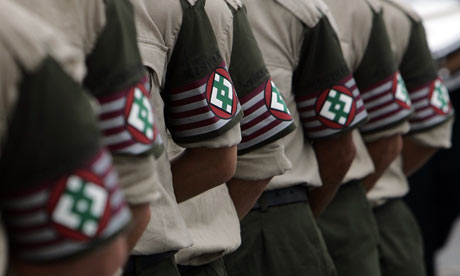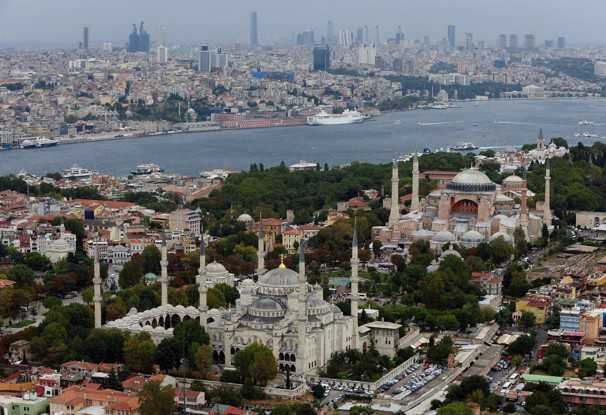- Ian Traynor
- Wednesday 27 May 2009

Members of Jobbik, a far-right Hungarian party which has been using Auschwitz slogans in its attempt to pick up votes. Photograph: Karoly Arvai/Reuters
In Europe’s biggest port, where nearly half the population of 600,000 is of immigrant origin, Geert Wilders appears to be knocking on an open door.
The platinum-blond, Islam-baiting populist is soaring in opinion surveys in the Netherlands, hammering the anti-immigration message to double his ratings this year to the point where his Freedom party is challenging to be the strongest in the country, according to a leading weekly tracking poll.
Wilders’ acolytes are also poised to enter the European parliament for the first time after elections for the EU’s sole democratically elected institution, covering 375 million people across 27 countries, take place next week.
“He’s a clown, crazy,” said Aarjen Heida, a Rotterdam banker, of the iconoclast banned from Britain for “hate speech” and facing trial in the Netherlands. “But he’s dangerous. A lot of people will vote for him. People are unhappy with the way things are going here and often that has to do with foreigners.”
Hans Oole, a retired Rotterdam food engineer, insisted he would not vote for Wilders next week. “I don’t like the way he says things. But sometimes he’s right. Most Dutch people are really afraid of Islam and it is coming all over.”
According to city statistics, ethnic Dutch residents will be a minority in Rotterdam within a few years. At present just over one third of children under 14 are ethnically Dutch. Wilders, who likens Islam to fascism and the Qur’an to Mein Kampf, exploits such figures to argue that the Netherlands is being swamped by immigration. He also hates the EU, pledging to try to abolish the European parliament when his party colleagues take their seats in July. He hopes to win five of the 25 Dutch seats.
Wilders’ success represents, in part, a souring of traditional Dutch enthusiasm for the EU. It also appears symptomatic of a broader insurrectionary mood across Europe that is expected to favour extremists, mavericks and populists in the voting taking place over four days from next Thursday. Overt racism and the calculated use of Nazi language are featuring in what is otherwise a lacklustre campaign.
In Austria, the hard-right Freedom party of Heinz-Christian Strache, tipped to take up to 20% of the vote, is pandering openly to antisemitism. “A veto of Turkey and Israel joining the EU,” declare the party posters despite the fact that Israel, unlike Turkey, is not negotiating to join.
Last week in the Czech Republic, state television broadcast a campaign slot from the small, fascist National party calling the large Roma community “parasites” and echoing Nazi formulation of the Holocaust policy from 1942 by demanding “a final solution of the Gypsy question”.
The party is not expected to get into the European parliament, but in Hungary the far-right Jobbik, which boasts black-shirted paramilitaries and maintains relations with the British National party, has been using Auschwitz slogans and running a lurid anti-Gypsy campaign.
It, like the BNP, could make an electoral breakthrough and win a seat in the parliament which is sited alternately and at great cost in Strasbourg and Brussels.
If the far right is making inroads, the hard left, too, may benefit from the disenchantment with mainstream parties, notably in two of the core EU countries, Germany and France.
The new anti-capitalist party of a postman Trotskyist, Olivier Besancenot, is predicted to win around 10% of the vote in France, while the New Left in Germany – former East German communists allied with West German social democratic defectors – could do likewise. Both parties’ gains will hurt the mainstream social democrats.
The chances of the Europhobic extremists entering the parliament are strengthened by the wretched turnout expected next week.
“The low turnout means that those who do vote have very strong opinions. That will bring in more extremist politicians,” said Sara Hagemann, a Danish analyst at the European Policy Centre in Brussels. “You’ll see a lot of protest voters in Europe and a lot of apathy towards political elites.”
The lack of interest in the election, or protesting by abstaining, could spell a crisis of legitimacy for the parliament and of credibility for the EU more broadly.
It is virtually certain that voters will stay away in record numbers, making participation the lowest since voting for the parliament started 30 years ago.
A Eurobarometer poll predicts a turnout of 34%, more than 10 points down on 2004, but that may prove to be optimistic since the pollsters have consistently overestimated participation rates.
A poll-tracking study being run by the London School of Economics and Trinity College Dublin predicts a turnout of around 30%, meaning that more than two out of three voters across the EU will boycott the ballot.
“The risk of abstention is that it allows Eurosceptics and extremists to take over our debate and our future,” José Manuel Barroso, the European commission president, warned recently.
Mobilising voters is made more difficult by the fact that the election does not decide a government, nor are the 736 MEPs elected able to initiate European laws, reinforcing the popular notion that the parliament is a remote, irrelevant talking shop.
In fact, voter turnout is in inverse proportion to the parliament’s growing powers. Turnout has fallen in each of the seven elections since 1979, while every treaty reshaping the way the EU is run has increased the parliament’s clout. It now has a say in shaping around 75% of European law.
From next year, if the Lisbon treaty is implemented following a second referendum in Ireland in October, it will be empowered to “co-decide” almost all European laws, making the parliament one of the big winners of the Lisbon streamlining reforms.
In what already looks like a doomed attempt to combat indifference and drum up interest in the ballot, the parliament itself – as opposed to the competing parties – has hired a German PR firm and spent some €18m (£15.6m) of European taxpayers’ money trying to sell the election.
“Come on! It’s just a few minutes, maybe you can combine [voting] with a walk in the park or a drink in a cafe. Not much effort to tell Europe what you want,” pleads the parliament propaganda.
It is falling on closed ears. The lavish spending only compounds the parliament’s problems, reinforcing the conviction that MEPs are either wasting taxpayers’ money or pocketing it.
With around 9,000 candidates running for the 736 seats and with each national ballot turning on the idiosyncrasies of 27 vastly different countries, variations in voting behaviour will be marked.
In Germany, for example, the poll will be analysed closely for what it portends for the general election in September, Europe’s most important political contest this year.
In France, it is likely to be seen as a referendum on two years of President Nicolas Sarkozy, while in Italy, the election will be scrutinised to see if Silvio Berlusconi’s marital breakdown is damaging his popularity.
Despite the national variations, trans-national trends are discernible as voters look like venting their anger on incumbents because of the economic crisis, and growing unemployment.
The French, Italian, and Polish governments may be the big exceptions to this trend. But Euroscepticism, previously a British and, to a lesser extent, a Scandinavian characteristic, is spreading even into the historical heartland of the EU, such as the Netherlands.
“The Dutch have become very cantankerous. It’s very sad,” said a senior EU official. “They’ve gone from being the most pro-European country to one of the most anti-European.”
While Wilders pledges to destroy the EU “from within”, the hard-left Socialist party’s pitch is for “more Netherlands, less Brussels”. And among the centrist parties in government in the Netherlands, there is little positive being said about Brussels or the EU. “Even among the non-extreme parties, scepticism has crept in,” said Hagemann.
Leading this new movement of Eurosceptics and seeking to establish it as a more powerful transnational political force in Europe are David Cameron’s Conservatives, who are pledged to end two decades of alliance with the mainstream European centre-right (the European People’s party) and form a new caucus of European Conservatives.
The entry of several dozen extremists and populists will make the parliament a more raucous, bad-tempered place, but will not substantively affect the balance of power between Christian Democrats, social democrats and liberals.
But Cameron’s move should have more impact. He has been helped by the entry of central European countries in 2004. He will depend on rightwingers from Poland and the Czech Republic and a few other countries to set up the new grouping, which will signify the biggest change in the new five-year parliament.
The LSE-Trinity College study predicts more than 60 seats from up to nine countries for the new Conservative caucus, making it the fourth biggest in the parliament. It will be loud in its condemnation of the Lisbon treaty and will campaign for the “repatriation” of powers from Brussels to national capitals.
“We will be very united in limiting European power,” said Konrad Szymanski, a Polish MEP from the rightwing Law and Justice party which will supply the second biggest bloc of MEPs after the British.
The election will usher in a busy few months at the top of European politics – Barroso’s expected renomination as head of a new commission a fortnight later at a European summit; a German election; an Irish referendum; and probably a contest for the two plum posts of first European president and foreign minister.
But the low turnout and predicted gains for anti-Europeans will get this burst of high-powered politicking off to a bad start.
Source: www.guardian.co.uk, 27 May 2009









